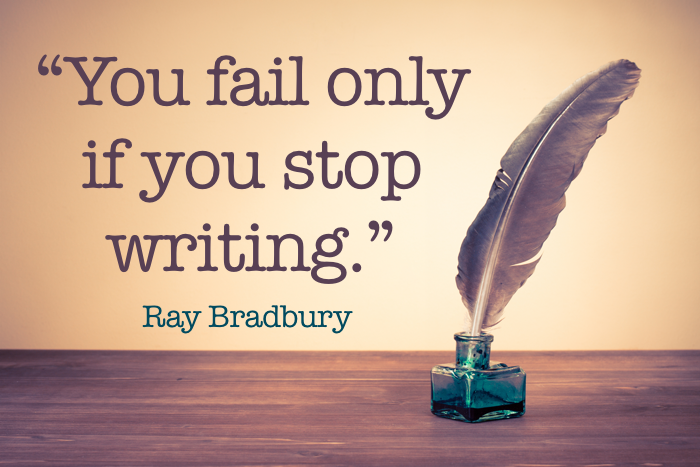4 things that stop you writing: #2 The Fear of Failure
Tom Evans is the author of Blocks: The Enlightened Way to Clear Writer’s Blocks. Follow him on Twitter at @thebookwright.
 #2: The Fear of Failure
#2: The Fear of Failure
The best way to avoid failure is not to try in the first place. Nobody can have a dig at you for the quality of your writing, or the number of copies of your book you have sold, if you haven’t written it. The same holds true for a new invention, product or service in business.
The signs that this is happening in your life are:
- Giving up at the first hurdle
- Being overly affected by rejection letters
- If you err on the side of the glass being half empty
“At least I know 10,000 things that don’t work,” said Edison when looking for the perfect material for the electric light filament.
Failure is a relative term.
Let’s say you only sold one copy of your book but the person who read it was inspired by it and went on themselves to write a best seller, or change the world, you could rightfully argue that your book was successful.
I think we all agree Dan Brown is one of the most successful authors in history, yet his books attract all kinds of criticism – especially his latest The Lost Symbol. Now I’ve not met Dan Brown but I am guessing he’s not too bothered about this. His aim was probably more to entertain than to write a literary classic – and to make money – so he can be rightfully proud of his achievement of his goals.
So with your first book, a good strategy to avoid failure is to set the parameters up that constitute success – these are all perfectly acceptable for first time authors:
- completion of your manuscript
- having a copy of a book you have written in your hands
- signing a copy for a reader
- getting your first review
- learning the in’s and out’s of the publishing process
- it opens a door, or makes a connection, for you that your wouldn’t have stepped through otherwise
On top of this, any amount of actual sales is a real bonus and any book that sells over even 1,000 copies can be seen as a success for a first timer.
Strategies for Successful Submissions
So if you are submitting a manuscript for submission to a publisher, here’s how to guarantee you cannot possibly fail.
- Check with the publisher’s or agent’s web site that they are taking submissions – this avoid failure at the first hurdle
- Read their submission guidelines and adhere to them
- If you get a rejection, like Edison, learn from it especially if they give you feedback. If they don’t you at least know that they are not right for you or your manuscript at this time.
- Do not get angry at them or yourself
- When you get accepted, celebrate and shout from the rooftops to give yourself a deserved pat on the back and to encourage others.
So in summary, there is no failure, only learning. The real failures are those who don’t try.
Next week: The Fear of the Unknown



I have done all but one that is mentioned at the begining of this blog. I have yet to catch the attention of an important figure to do a review of my book. Do you think it helps to have personal opinions of readers posted on the website?
I would just leave off the failure parameters all together – the only real failure is not to try at all 🙂
I couldn’t agree more that the key to success is to define your own parameters for success and failure.
Most of my blocks is usually coming from a good idea I’ve head, which I then wrote down very quickly and found it silly. This of course could be avoided with some work on the idea before I got to excited. It’s easy to let the mind roll, just don’t let it roll too far with you work, as the backtracking might be difficult!
Okay…I’m new here. I get the writer’s block thing. It’s hard sometimes to pull yourself up after publishing a book and not having it do as well as you antisipated…stinks, really. We all know that you have to shake it off, and quickly. I think most authors are in it for the thrill of the craft, or the escape it offers or the raw fact that we just can’t stop. I think that most of us who do this writing thing, are doing it because we have to…really. If you really find that you can’t work, the best advice I have is to take a break, come up with something that inspires you, or makes you laugh or makes you angry or just makes you feel, and start fresh. Whatever you do, don’t stop if it’s what you love.
Thanks for the encouraging words!
Great post – have bookmarked it and look forward to looking through the rest of your blog! I’ve been putting off doing a magazine article for the last two weeks and definitely needed this kick up the backside! 🙂
So you have managed to overcome your writer’s block enough to finish the book. It get’s published – Whoopee!! The difficulty now is starting the next one when the first one doesn’t sell. Lethargy sets in together with that awful feeling of “what is the point?” How to get over this block, that’s the tricky one.
Thanks Matt – nobody should ever be shot down for trying 🙂
Great advice, and I think that’s the best attitude. I like the scientific attitude myself. Every time a scientific hypothesis is proved wrong, you learn something about the nature of what you’re studying, even if it’s just that it’s not what you thought it was. So every failure is still a success!
The same is true here. Just the experience of writing and submitting, and the feedback you get – you’re learning every time, so that you can make your next one better. Every failure is a success.